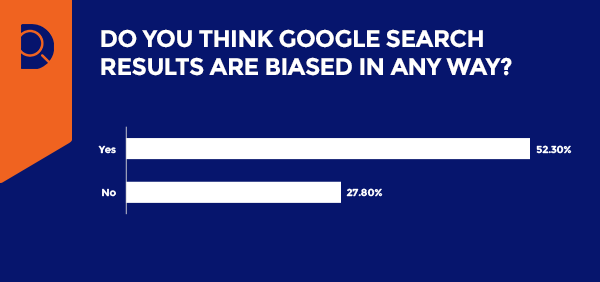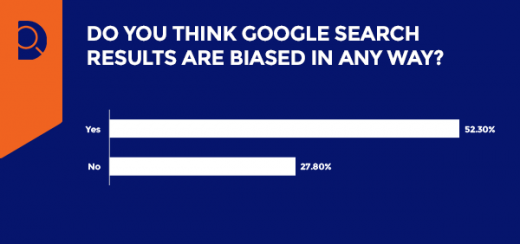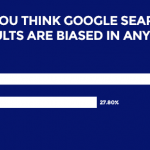New Research Shows 52% of People Believe Google Search is Biased
— September 22, 2017
New research by Digital Examiner shows that 52% of users believe Google search is biased. In a survey measuring consumer confidence in Google, 1000 people were asked if they thought Google’s search results were biased in any way.

The fact that 52% of users think Google search is biased might sound surprising, but when you consider the fact that Google was regularly accused of bias around the time of the 2016 election, perhaps the findings are to be expected. Some publications accused Google’s search results of rightwing bias while those on the right complained Google was actually biased towards the left politically. In reality, accusations of bias aimed at Google are nothing new. As far back as 2004, Google was accused of right wing bias in how they generated stories for the then three-year-old Google News service.
Is Google Biased?
While accusations of Google’s bias are fairly widespread, the question remains as to whether or not there is any merit in these accusations. The fact that Google has faced accusation of bias from both sides politically does not help either argument. However, with such widespread belief of Google bias, it is an area that deserves further investigation – something which SEO company CanIRank decided to do. They conducted a study where they collected the top 40 results for 50 politically sensitive search terms like “Hillary Clinton,” “Donald Trump,” “abortion,” etc. They then had a bipartisan panel rank each search result in terms of political viewpoint on a scale of 1-5. 1 represents the hard left, 5 the hard right, and 3 for a neutral viewpoint.
Their study came to some interesting conclusions:
- Searchers are 41% more likely to find a far left or left viewpoint in Google’s top results than right-leaning content.
- 56% of page 1 search results demonstrated some political bias.
While the results of this research do provide some food for thought, there are some very obvious drawbacks that stop us from drawing too strong a conclusion from these findings. One important consideration is that different sites have different levels of optimization in terms of SEO. If a left leaning site has a really user friendly website that excels in terms of SEO, then it will out rank a rightwing site that is not search engine optimized. The study does however add fuel to the fire in terms of Google bias. While Google’s algorithm may or may not need work to eliminate any bias, one thing is certain, the company needs to work on the public perception of bias in their search results if they want to maintain their position – outlined in a recent study – as the nation’s most trusted resource.
What Can Google Do?
On the one hand accusations of bias have been directed at Google for nearly as long as they have been around and it hasn’t exactly hindered their growth into the search behemoths they are today. However, the rise of Twitter and other social media channels has opened the door to a new wave of scrutiny never before experienced. Add in the fact that we are living in increasingly polarized times politically and you can’t help escape the feeling that this issue is not going to go away.
It is highly unlikely that Google intentionally pushes a political agenda in their search results. However, the Swedish journalist Andreas Ekström used the stage at TEDxOslo to outline his theory that an unbiased search result is a philosophical impossibility. It is Ekström’s contention that “behind every algorithm is a set of personal beliefs that no code can ever completely eradicate”. After all, we all have a set of unconscious biases that affect our actions. Google however is something of a leader in the area of unconscious bias in the workplace and have launched their own employee training which helps employees spot unconscious bias at work. Whether or not this employee training can help them face down accusations of bias in their search results remains to be seen.
The training covers much broader workplace issues than Google’s search algorithm but if there is any unconscious biases shaping Google’s search results, employee training will certainly help to eradicate them. Perhaps the easiest and, unfortunately, most unlikely way to eliminate accusations of bias would be to lift the lid on the notoriously secretive algorithms that power their search engine.
Digital & Social Articles on Business 2 Community
(31)












